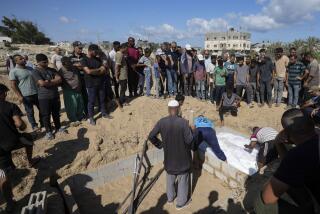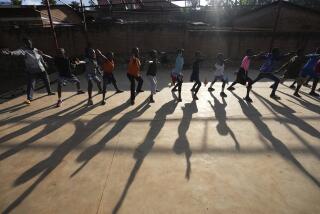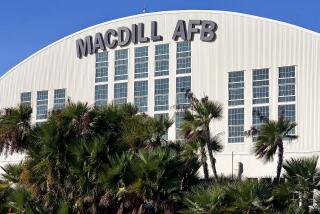2,108 Corpses Dug Up So Far in Kosovo Effort
- Share via
UNITED NATIONS — War crimes investigators have unearthed 2,108 bodies from grave sites in Kosovo and expect to find more in the coming months, the chief prosecutor told the U.N. Security Council on Wednesday.
U.N. investigative teams have examined 195 grave sites so far in their effort to establish evidence of systematic killing this spring of ethnic Albanians by Serbian forces, chief prosecutor Carla del Ponte said. The findings will be presented to the war crimes tribunal.
The teams intend to examine a total of 529 sites thought to contain the bodies of 11,334 people missing and believed dead, starting first with locations named in charges against Yugoslav President Slobodan Milosevic and other Serbian leaders accused of crimes against humanity.
Deputy chief prosecutor Graham Blewitt said that while most of the victims appeared to be Albanian, there were some Serbian victims too.
The investigation provides the first official figures about victims of the war in Kosovo, a separatist province of Serbia, the dominant Yugoslav republic. Soon after the 11-week NATO bombing campaign against Milosevic ended, local human rights groups estimated that at least 10,000 ethnic Albanians had died at Serbian hands.
Del Ponte refused to speculate on final numbers, saying that more than 300 graves had yet to be opened.
“The importance is not the numbers of the victims, but how they were killed”--and by whom, she said. The team is collecting evidence of methods that were organized, premeditated and particularly cruel, she added.
Del Ponte noted that in their five months of work, the teams have found fewer mass graves than had been feared. “We do not, typically, find hundreds of people buried together,” she said. The teams are discovering a large number of smaller sites instead. Of the 195 sites examined so far, 11 contained more than 50 corpses.
In one place previously thought to have as many as 700 victims, a mine at Trepca where soldiers reportedly dumped corpses down mine shafts or dissolved them in acid, the investigators did not find any bodies.
But Del Ponte said the numbers being compiled by the teams could be deceiving.
“The figure does not necessarily reflect the total number of actual victims, because we have discovered evidence of tampering with graves,” Del Ponte said. “There were also a significant number of sites where the precise number of bodies cannot be counted. In these places, steps were taken to hide the evidence. Many bodies have been burned.”
The rest of the burial sites will be examined after the winter months, and Del Ponte urged that the work be completed quickly before the remaining burial grounds can be disturbed.
“We cannot leave the job only half-finished,” she said.
The prosecutor asked for the Security Council’s help to stop Croatia’s hindrance of the tribunal’s investigations and Yugoslavia’s “total defiance” in refusing to surrender fugitive Serbian leaders who have been indicted on war crimes charges. So far, in Bosnia-Herzegovina, 14 people have been arrested since July 1997, she said, but many others have fled into the Serb-controlled half of Bosnia, beyond the reach of international authorities.
Milosevic is widely seen as the architect of the war earlier this decade in Bosnia.
“I’m confident we will have more arrests next year,” Del Ponte said, “or next month.”
More to Read
Sign up for Essential California
The most important California stories and recommendations in your inbox every morning.
You may occasionally receive promotional content from the Los Angeles Times.













